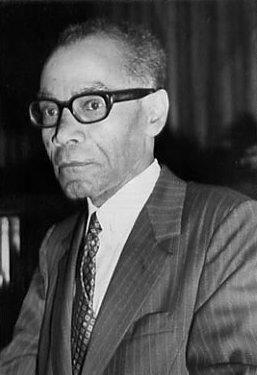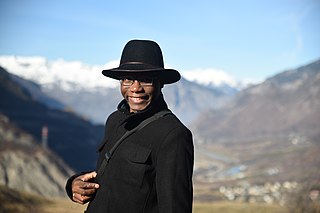Related Research Articles

Frantz Omar Fanon was a Francophone Afro-Caribbean psychiatrist, political philosopher, and Marxist from the French colony of Martinique. His works have become influential in the fields of post-colonial studies, critical theory, and Marxism. As well as being an intellectual, Fanon was a political radical, Pan-Africanist, and Marxist humanist concerned with the psychopathology of colonization and the human, social, and cultural consequences of decolonization.

Aimé Fernand David Césaire was a Francophone Martinican poet, author, and politician. He was "one of the founders of the Négritude movement in Francophone literature" and coined the word négritude in French. He founded the Parti progressiste martiniquais in 1958, and served in the French National Assembly from 1945 to 1993 and as President of the Regional Council of Martinique from 1983 to 1988.

The Wretched of the Earth is a 1961 book by the philosopher Frantz Fanon, in which the author provides a psychoanalysis of the dehumanizing effects of colonization upon the individual and the nation, and discusses the broader social, cultural, and political implications of establishing a social movement for the decolonisation of a person and of a people. The French-language title derives from the opening lyrics of "The Internationale" anthem.
Négritude is a framework of critique and literary theory, developed mainly by francophone intellectuals, writers, and politicians of the African diaspora during the 1930s, aimed at raising and cultivating "Black consciousness" across Africa and its diaspora. Négritude gathers writers such as sisters Paulette and Jeanne Nardal, Martinican poet Aimé Césaire, Abdoulaye Sadji, Léopold Sédar Senghor, and Léon Damas of French Guiana. Négritude intellectuals disavowed colonialism, racism and Eurocentrism. They promoted African culture within a framework of persistent Franco-African ties. The intellectuals employed Marxist political philosophy, in the Black radical tradition. The writers drew heavily on a surrealist literary style, and some say they were also influenced somewhat by the Surrealist stylistics, and in their work often explored the experience of diasporic being, asserting one's self and identity, and ideas of home, home-going and belonging.

Léon-Gontran Damas was a French poet and politician. He was one of the founders of the Négritude movement. He also used the pseudonym Lionel Georges André Cabassou.
Créolité is a literary movement first developed in the 1980s by the Martinican writers Patrick Chamoiseau, Jean Bernabé and Raphaël Confiant. They published Eloge de la créolité in 1989 as a response to the perceived inadequacies of the négritude movement. Créolité, or "creoleness", is a neologism which attempts to describe the cultural and linguistic heterogeneity of places like the Antilles and, more specifically, of the French Caribbean.

Blackness may refer to:

René Depestre is a Haitian poet and former communist activist. He is considered to be one of the most prominent figures in Haitian literature. He lived in Cuba as an exile from the Duvalier regime for many years and was a founder of the Casa de las Américas publishing house. He is best known for his poetry.
Lamine Diakhate was an author, poet and literary critic of the négritude school and has served his country as a politician and diplomat.

Présence Africaine is a pan-African quarterly cultural, political, and literary magazine, published in Paris, France, and founded by Alioune Diop in 1947. In 1949, Présence Africaine expanded to include a publishing house and a bookstore on rue des Écoles in the Latin Quarter of Paris. The journal was highly influential in the Pan-Africanist movement, the decolonisation struggle of former French colonies, and the birth of the Négritude movement.
Jacques Rabemananjara was a Malagasy politician, playwright and poet. He served as a government minister, rising to Vice President of Madagascar. Rabemananjara was said to be the most prolific writer of his negritude generation after Senghor, and he had the first négritude poetry published.

Buata Bundu Malela is a specialist in comparative literature and historian of the intellectuals of the Afro-West-Indian diaspora. He was born in Kinshasa, Zaire in 1979 to Congolese and Senegalese parents.
Une Tempête is a 1969 play by Aimé Césaire. It is an adaptation of Shakespeare's The Tempest from a postcolonial perspective, set on an island in the Caribbean. The play was first performed at the Festival d'Hammamet in Tunisia under the direction of Jean-Marie Serreau. It later played in Avignon and Paris. Césaire uses all of the characters from Shakespeare's version, with some additions and new renderings of the original cast.
Jeanne "Jane" Nardal was a French writer, philosopher, teacher, and political commentator from Martinique. She and her sister, Paulette Nardal, are considered to have laid the theoretical and philosophical groundwork of the Négritude movement, a cultural, political, and literary movement, which first emerged in 1930s, Paris and sought to unite Black intellectuals in the current and former French colonies. The term "Négritude" itself was coined by Martiniquan writer-activist Aimé Césaire, one of the three individuals formally recognized as the "fathers" of the cultural movement, along with Senegalese poet Léopold Senghor and French Guianese writer Léon Damas. It was not until relatively recently, however, that the women involved in the Négritude movement, including Jane and Paulette Nardal, began to receive the recognition they were due.

L'Étudiant noir, subtitled Journal mensuel de l’association des étudiants martiniquais en France, is a journal created by the Martinican Aimé Césaire in 1935 in Paris. The Guyanese Léon-Gontran Damas published his first pigmentary poems, and Senegalese Léopold Sédar Senghor his first articles, in the magazine while they were students. Damas would define it as "...a corporative and combative journal which aimed to end tribalization and the clan system in force in the Latin Quarter! We ceased to be Martinican, Guadeloupean, Guyanese, African and Malagasy students and became one and the same black student."
Paul Niger was a poet and political activist from Basse-Terre, Guadeloupe. He was born Albert Béville, but Niger's passion for Africa led him to take the pen name of the great African Niger River. His major theme was Africa and the pride that he felt in being a descendant of Africans. According to the Encyclopedia of Caribbean Literature, Niger completed secondary studies at the Lycée Carnot in the town of Pointe-à-Pitre. Later on, during World War II, he travelled to Paris to attend the École de la France d’Outre-mer, a school established to train colonial officers. Niger was a supporter of the Négritude, a black consciousness movement founded by Aimé Césaire, Léon-Gontran Damas, and Léopold Senghor.

Paulette Nardal was a French writer from Martinique, a journalist, and one of the drivers of the development of black literary consciousness. She was one of the authors involved in the creation of the Négritude genre and introduced French intellectuals to the works of members of the Harlem Renaissance through her translations.

Cynthia R. Nielsen is an American philosopher and Professor of Philosophy at the University of Dallas. She is known for her expertise in the field of hermeneutics, the philosophy of music, aesthetics, ethics, and social philosophy. Since 2015 she has taught at the University of Dallas. Prior to her appointment at the University of Dallas, she taught at Villanova University as a Catherine of Sienna Fellow in the Ethics Program. Nielsen serves on the executive committee of the North American Society for Philosophical Hermeneutics.
Tropiques was a quarterly literary magazine published in Martinique from 1941 to 1945. It was founded by Aimé Césaire, Suzanne Césaire, and other Martinican intellectuals of the era, who contributed poetry, essays, and fiction to the magazine. While resisting the Vichy-supported government that ruled Martinique at the time, the writers commented on colonialism, surrealism, and other topics. André Breton, the French leader of surrealism, contributed to the magazine and helped turn it into a leading voice of surrealism in the Caribbean.
Martinican literature is primarily written in French or Creole and draws upon influences from African, French and Indigenous traditions, as well as from various other cultures represented in Martinique. The development of literature in Martinique is linked to that of other parts of the French Caribbean but has its own distinct historical context and characteristics.
References
- Notes
- ↑ on_Unjust_Times _Christian_Filostrat.html Variations on Unjust Times, Africana Homestead Legacy Publishers.
- ↑ "Hommage posthume à Léon-Gontran Damas", Présence africaine, 1979, p 134.
- ↑ Christian Filostrat, Negritude Agonistes, Assimilation Against Nationalism in the French-Speaking Caribbean and Guyana (Cherry Hill, NJ: Africana Homestead Legacy Publishers, 2009), pp. 123-128.
- ↑ Christopher l. Miller, "The (Revised) Birth of Negritude: Communist Revolution and "the Immanent Negro" in 1935 (PMLA, Vol. 125, No. 3, May 2010), p. 743.
- Bibliography
- "Frantz Fanon" www.frantzfanon.com